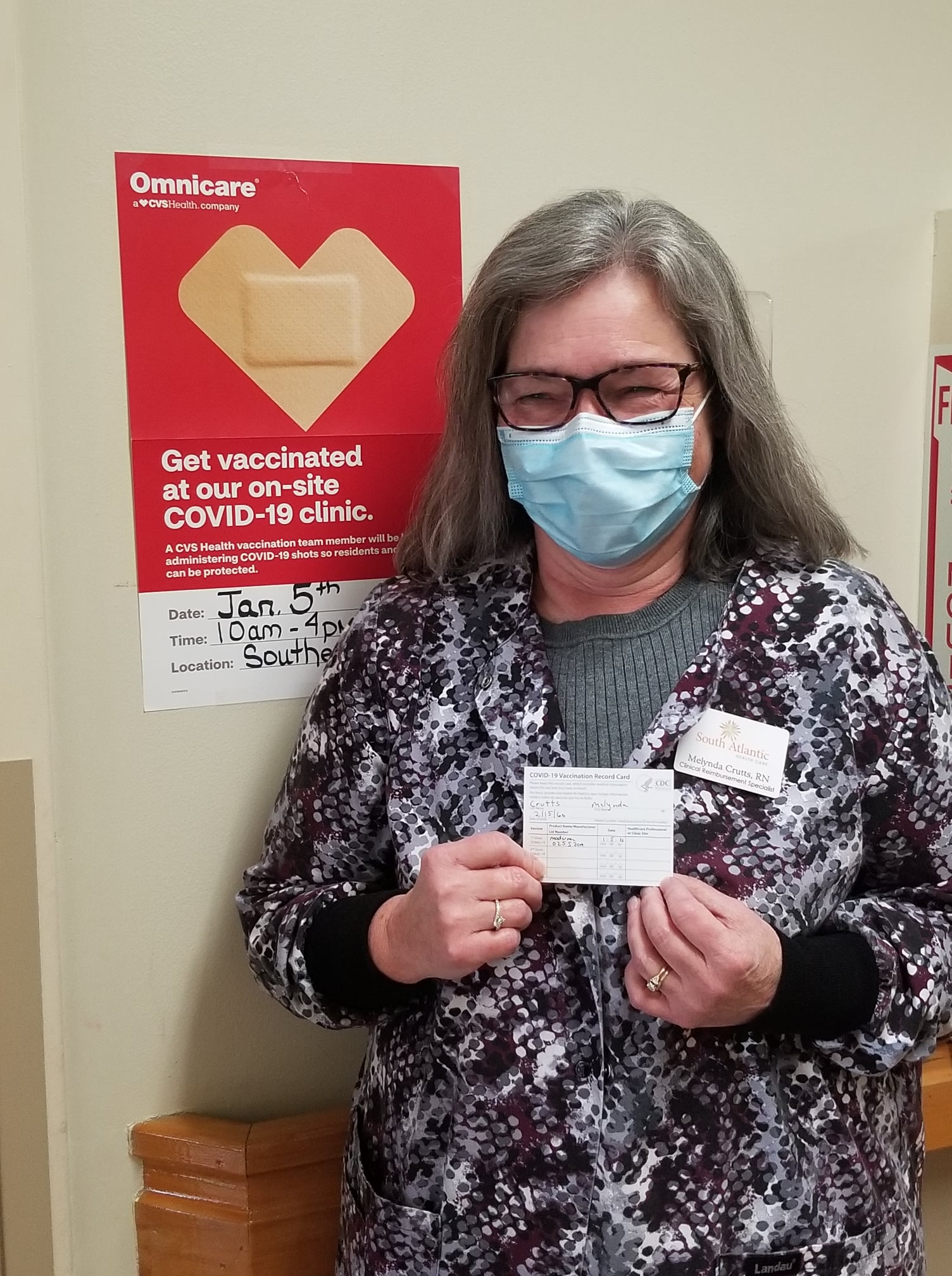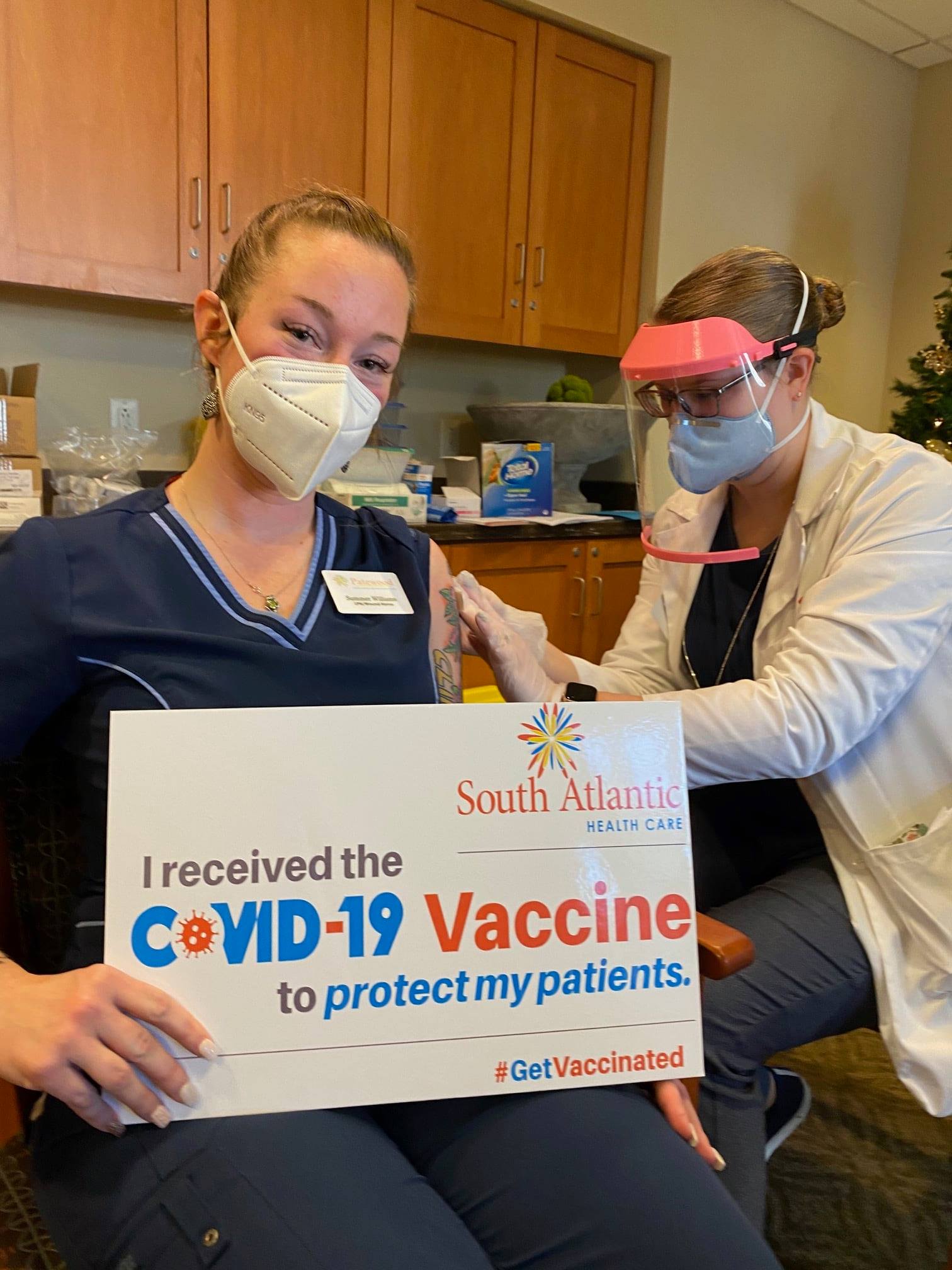Information About COVID-19
















As we turn the corner into 2021, South Atlantic Health Care continues to focus on fighting the coronavirus pandemic. 2020 is behind us, but COVID-19 is still very much a reality, so we put together some information and resources that shed a light on what we have been doing in our centers. Our patients are our priority, but we also want to serve their friends and family, and everyone else in the communities near and far.
So, check this page frequently as more information becomes available. Here is where you will find our latest COVID-19 statistics, up-to-date information on our visitation guidelines and communication from our leaders at South Atlantic Health Care. Consider it the one-stop-shop where you can learn more about what we do to keep people safe and healthy amid the spread of COVID-19. 2021 is already looking brighter than 2020, so join us in our commitment today.
COVID-19 Resources and News
- Health Guidelines – As soon as the pandemic hit, we implemented strict public health policies on top of our usual health and safety protocols. You can review them now.
- Stats by Location – Click here to find your location and view the latest COVID-19 testing stats. Our data is updated daily.
- Visitation Guidelines – We know how desperate you are to see your loved one during this difficult time, but we must take extra steps to make sure everyone remains safe and free of infection. Please review our visitation guidelines before coming to our center; feel free to call us directly with any questions.
- A message from our leaders – The South Atlantic Health Care leadership team, under the direction of President Brett Barnett, put this message together to communicate with our patients, our employees, and their friends and loved ones.
- Wellness Activities – To keep spirits high, South Atlantic Health Care has created new social activities and wellness programs to keep patients’ minds off the pandemic. Read about our success.
The COVID-19 Vaccine
 The breakthrough we have been praying for has officially arrived. COVID-19 vaccinations have been federally approved and are now being administered across the world. This a tremendous medical breakthrough, and South Atlantic Health Care is ready to roll up our sleeves and get started with these lifesaving vaccinations. Here are some important things to know:
The breakthrough we have been praying for has officially arrived. COVID-19 vaccinations have been federally approved and are now being administered across the world. This a tremendous medical breakthrough, and South Atlantic Health Care is ready to roll up our sleeves and get started with these lifesaving vaccinations. Here are some important things to know:
- We are in the process of securing COVID-19 vaccines to administer to our healthcare workers and residents. Vaccinations will be administered in order of priority, with the goal of getting everyone vaccinated sooner rather than later.
- The vaccine requires two separate doses that are administered about 3 to 4 weeks apart. South Atlantic Health Care has a system in place to ensure that every resident and medical professional in our centers receive both doses.
- As part of our commitment to health and safety, patients and employees will not have to pay for their vaccines.
- We are encouraging patients to take part in our COVID-19 Vaccination Drives to speed up the process. You can help by making sure they are signed up for two of the three clinic dates scheduled. There will be lunch and prizes during the Vaccination Drive.
 The COVID-19 vaccines have met the highest standards possible. Nearly 60,000 people were involved in the clinical trials, and the data was closely examined to determine any risk or concern. While exceedingly rare, some people may experience symptoms mimicking COVID-19 after taking the vaccine, but they are mild and disappear after just a day or two. There is no reason to be concerned – in fact, it shows that the vaccine is working and that the body is responding the right way. South Atlantic Health Care believes in the efficacy of this vaccine and is excited to finally deliver it to our patients, who need it the most.
The COVID-19 vaccines have met the highest standards possible. Nearly 60,000 people were involved in the clinical trials, and the data was closely examined to determine any risk or concern. While exceedingly rare, some people may experience symptoms mimicking COVID-19 after taking the vaccine, but they are mild and disappear after just a day or two. There is no reason to be concerned – in fact, it shows that the vaccine is working and that the body is responding the right way. South Atlantic Health Care believes in the efficacy of this vaccine and is excited to finally deliver it to our patients, who need it the most.
Physicians, like those we employ at our centers, have an essential role in ending the coronavirus pandemic. This, along with their increased risk of getting COVID-19 and spreading it to others, means it is vital for them to also receive a vaccine. Healthcare professionals across the world advocate for these vaccines, and we are proud to have our team join them in the fight.
Coronavirus FAQs
Who is most at-risk for COVID-19?
The risk for severe illness with COVID-19 increases with age. Older adults – the kind we treat at our centers – are at the highest risk. Certain medical conditions common in older adults, such as diabetes and lung disease, are considered underlying conditions and can also increase the risk for severe illness. Generally speaking, people in their 50s are at higher risk for severe illness than people in their 40s. Along those lines, people in their 60s or 70s are also at higher risk for severe illness than people in their 50s. Those at greatest risk for dangerous illness from COVID-19 are aged 85 or older. People at increased risk, and those who live or visit with them, should take all necessary precautions to protect themselves from the coronavirus.
It is important to note that no age group is completely immune to severe illness from COVID-19. Even young, healthy people have died from this disease, so all people are highly encouraged to protect themselves and others.
How do you reduce the risk for COVID-19?
Public health officials agree that the following behaviors can reduce your chance of coming down with COVID-19:
- Wash your hands frequently and avoid touching your face.
- Limit in-person contact with other people as much as possible, specifically people who do not live with you.
- Whenever you do interact with anyone outside of your home, cover your mouth with a mask and keep at least six feet away.
- Clean and disinfect the surfaces in your home and office regularly.
Following these rules will keep you safe during this uncertain time.
What should I do if I think I have COVID-19?
If you are experiencing symptoms related to COVID-19, get in touch with your healthcare provider as soon as possible and discuss the steps you should take when you feel sick. Monitor your symptoms regularly — most people usually start to experience them between 2-14 days after exposure. If they start getting worse, contact your doctor again to determine what you should do next. They may recommend you get tested, which will officially determine whether you are infected. Regardless of the result, your doctor will tell you to continue to monitor your symptoms and to seek immediate medical attention only if they become life-threatening.
What are South Atlantic Health Care centers required to do to prevent the spread of coronavirus?
We adhere to the CDC’s guidelines and strategies for nursing homes and other long-term care centers to ensure safety for all our residents. Our efforts include – but are not limited to – identifying infection early, preventing spread by limiting patient-to-patient contact, supplying patients with proper PPE and other mitigation supplies like hand sanitizer, and designating specific COVID-19 treatment spaces that are apart from and do not impact general treatment spaces.
When I visit South Atlantic Health Care, do I need to practice social distance?
Yes. We know it is not ideal, but it is done to keep everyone in our center as safe as possible. Our centers encourage everyone to stay six feet apart and to limit the duration of their visit. We also require masks to be worn inside and discourage close contact with patients, such as hugging or shaking hands. Please make use of our hand sanitation stations and do not interact with any patient who is not your loved one.
What other COVID-19 prevention guidelines are in place?
There are multiple precautions we have taken since the federal government declared the pandemic a national emergency, and we will follow them (at least in some form) until the crisis is officially behind us. The key precautions are:
- Limiting visitation hours and restrict the number of visitors
- Requiring visitors, as well as employees and physicians, to always wear a mask while inside our center
- Regularly testing employees, physicians, and residents for symptoms
- Keeping social distance in mind when planning events and social gatherings for patients
What happens if my loved one gets COVID-19?
SAHC is in strict accordance with the CDC guidelines for nursing home patients who test positive for COVID-19. We follow every step necessary to not only ensure the well-being of your loved one but also the wellbeing of every other resident they may have been in close contact with while positive. This means a 14-day quarantine, regular testing from our staff, and the frequent monitoring of symptoms. Most residents can recover from COVID-19 during this period; others may require more serious treatment that will be determined by their physician and communicated to you and your family in full detail.